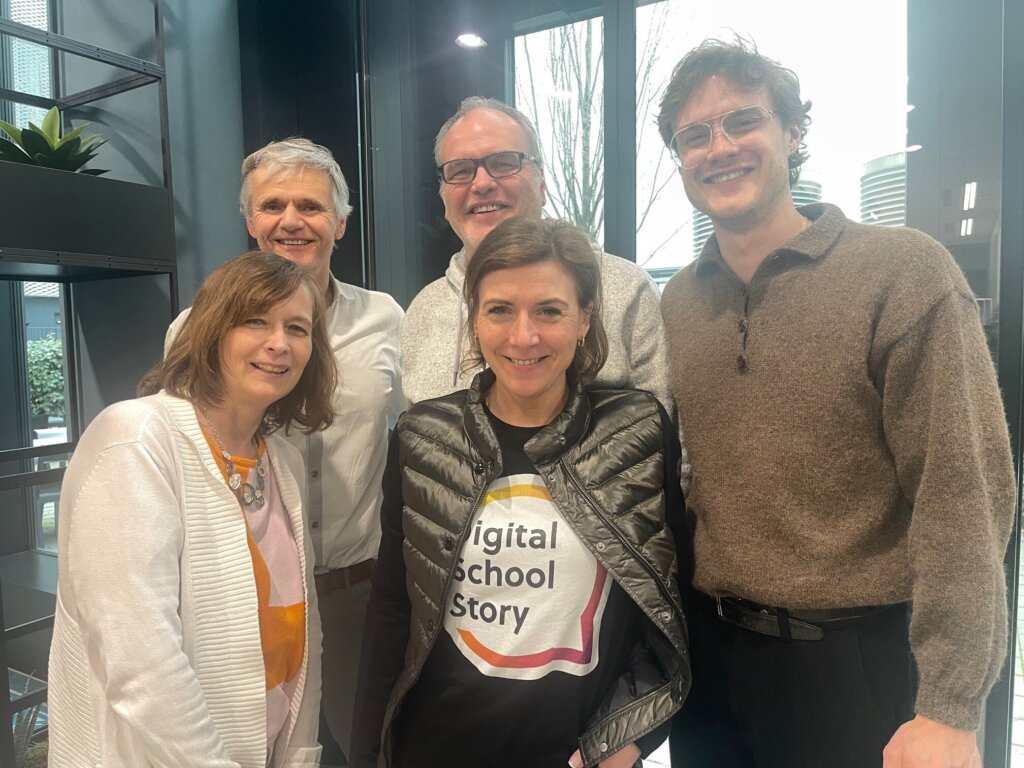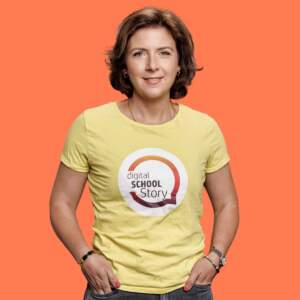Start with our CDR Quick Check and become part of the CDR development partnership.
EdTech DigitalSchoolStory as part of the CDR development partnership
DigitalSchoolStory is a new development partner of the CDR initiative. Together with the CDR office, the non-profit educational initiative has been developing its CDR in line with the CDR maturity model since spring 2025. In doing so, the organisation is sending a strong signal: media literacy and digital responsibility belong in the classroom as practical skills and as core part of the curriculum.

From media literacy to digital responsibility
The non-profit organisation DigitalSchoolStory inspires young people by translating learning content into short social media-style videos. In doing so, they experience first-hand how digital platforms work:
- What data and incentive systems drive social media,
- what opportunities and risks are associated with public visibility, and
- how critical reflection becomes a key competence in the digital space.
In this way, pupils learn not only to use media creatively, but also to exercise their right to informational autonomy and take responsibility.
-

With DigitalSchoolStory, we empower young people to take control of their digital lives. Through creative storytelling, they learn how data and incentive systems work in social media, thereby developing digital responsibility. This is exactly what we mean by CDR in practice.
Nina Mülhens
Co-founder and managing director of DigitalSchoolStory
Key topics of the CDR development partnership by DigitalSchoolStory
In a workshop with the office of the CDR Initiative, four key areas of work were defined in which CDR plays a central role:
- Inclusion of CDR in direct project work with stakeholders: This concerns, among other things, areas of action in the CDR Code such as inclusion and education. DSS, for example, runs projects at schools for children with special needs and with young people who have experienced displacement, such as Ukrainian schoolchildren. Easy access to digital media creates equal opportunities.
- Selection and application of digital technologies: DSS provides insights into social media mechanisms that shape digital platforms. Key CDR topics such as the responsible handling of data and stakeholder involvement are addressed, for example, by embedding questions about copyright and data protection in the content and providing systematic education. The use of technology is designed responsibly and aligned with ethical, comprehensible and transparent standards.
- Targeted development of socially relevant topics: Educational work is the focus of DSS projects. This involves implementing educational work using innovative approaches, but also providing education and information about the impact of digital content and the consequences of visibility. In this context, DSS develops current projects with high social significance, such as democracy (‘Demokratielust statt Demokratiefrust’), value formation, career orientation with a future, and digital security (‘Das Netz als sicherer Ort’).
- The DSS method is further developed through a continuous improvement process (CIP): questions and potential for improvement are systematically documented in projects, while relevant trends and developments in the field of digital responsibility are actively monitored. With the involvement of management and external expertise, targeted measures are derived, the impact of which is evaluated by internal and external stakeholders.
What does the CDR initiative stand for?
The aim of the Corporate Digital Responsibility (CDR) initiative is to make digital responsibility a standard practice for organisations across all industries. At the heart of the initiative is the CDR Code, which defines five areas of action, including data management, education, inclusion, climate and resource protection, and employee engagement. With the CDR-Quick-Check, organisations can assess their status in the area of digital responsibility in just 10-15 minutes and derive concrete measures.
DigitalSchoolStory is the first non-profit organisation in the CDR development partnership and demonstrates how CDR can be effectively implemented in educational contexts.
-

We take a holistic approach to sustainability, and digital responsibility is central to this. Education that empowers young people to navigate the digital world confidently, critically and independently is key to the future viability of society. With our CDR engagement, we provide sustainable educational impetus that goes far beyond the classroom.
Dr. Stefanie Gerlach
Contact person at DigitalSchoolStory
A learning path, not a project
In the CDR development partnership, organisations work together with the CDR initiative to responsibly develop their digital business models – in a practical and efficient manner. Whether it's the first steps, targeted improvements in individual areas or the next level of maturity in CDR management, the CDR development partnership meets organisations where they are and makes CDR a factor for success.
Interested in working with us?
About DigitalSchoolStory
Since 2020, DigitalSchoolStory gGmbH has been empowering pupils in grades 5 to 13 to creatively translate learning content into short videos à la TikTok or Reels. The method teaches media literacy, strengthens 4C+ skills (communication, creativity, critical thinking, collaboration) and promotes democratic participation and self-expression. The learning method is used in schools, apprenticeships and universities. It has been scientifically evaluated by the Fraunhofer Institute FIT. The organisation was awarded the Corporate Digital Responsibility Award in 2023 for its work and is one of the national winners of the startsocial competition 2023/24. Since 2025, the patronage has been shared by Dr Fabian Mehring, Bavarian Minister for Digital Affairs, and Jutta Croll, Chair of the Digital Opportunities Foundation and renowned expert on children's rights in the digital space. Together, they represent the central areas of activity of DigitalSchoolStory: digital education and children's rights in the digital space.
Further information: www.digitalschoolstory.de
Press contact: presse@digitalschoolstory.de
